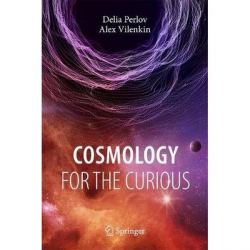
Book Review: Cosmology for the Curious

What will Curious George grow up to be? Being curious, then George will ask a lot of questions. And if lucky then physics will be George’s destiny, for physics seems to have so many answers. From the biggest to the smallest, that’s its purview. And for Delia Perlov and Alex Vilenkin in their book “Cosmology for the Curious” aim to answer a great many of those questions. Or at least those questions pertaining to mankind’s place in space.
Cosmology is all about space and time. Which means that this book begins by traveling back in time. Traveling to the time of the Greeks. Hundreds of years b.c.e. Apparently the Greek philosophers did a lot of pondering about the smallest of things they called atoms. And the largest, they called planetary epicycles. From this baseline the book very quickly progresses through the traditional growth of knowledge with some choice descriptions.
As an example it proposes energy as nature’s ultimate currency. And it allows the reader to wonder. Wonder why the sky is black at night. And ask questions. As in “why is the speed of light the same as the Earth travels about the Sun?”
Most of the descriptions rely on Newtonian mechanics for explanation but it is only a slight passing for the book quickly raises Einstein’s field equations, particularly emphasizing inertial frames of reference. With this, the reader is accorded a pleasant view of Lorentz transforms, a somewhat abstract view of the Sun being flung out of the solar system by a very large golf club and a realization of how the GPS navigation system incorporates gravitational time dilation. Still all this is simply the cosmological baseline for the reader.
Now the neat thing about cosmology is that there is simply no first hand observation. Most everything of interest happened a long time ago and in a somewhat different relative location. And this is the book’s next and most rewarding destination. Through many arguments or thought experiments, it associates the cosmic microwave background with redshifts and the changing spatial dimensions.
Later, postulated dark matter and dark energy refocus the reader’s attention on the very beginning of the universe in a big bang. Or perhaps a multiverse of many shapes and various physical laws. Which of course leads to considerations about what’s next. How will our universe continue? Will it go to a quiet heat death or will we be gobbled up by another bubble universe? We can’t determine from our vantage point on Earth. But this book does provide its own vantage point.
Helping this book along are a number of pleasant additions. For one, often when an accomplished researcher is mentioned, there’s an accompanying, quite complementary photograph. And equations are liberally spread throughout as if teasing the reader to explore more. But the book has very little math. And best of all are the questions at the end of each chapter. Now these questions aren’t your typical textbook questions. For example, consider “Inflation is almost certainly eternal to the future. Is it eternal to the past too? Why/why not?” Isn’t this a great question? And one that you really can’t get wrong.
Which of course begs the question “Why aren’t you as curious as George?” There’s a whole universe out there waiting for us to explore and understand. Let’s not take it for granted. Let’s satisfy our curiosity perhaps with reading the marvellous book “Cosmology for the Curious” by Delia Perlov and Alex Vilenkin. After all you don’t want to be upstaged by George, do you?
The post Book Review: Cosmology for the Curious appeared first on Universe Today.
Universe Today
Go to Source
Powered by WPeMatico